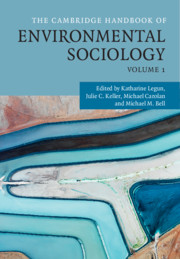Book contents
- The Cambridge Handbook of Environmental Sociology Volume 1
- The Cambridge Handbook of Environmental Sociology
- Copyright page
- Contents
- Figures
- Tables
- Contributors
- Foreword
- Introduction
- Part I Theory in Environmental Sociology
- Part II The Economy and Environmental Sociology
- 6 Material Worlds: Understanding the Relationship of Capital and Ecology
- 7 Green Economies and Community Wellbeing
- 8 Beyond the Limits to Growth: Neoliberal Natures and the Green Economy
- 9 The Ecosocialist Alternative
- 10 Commons, Power, and (Counter)Hegemony
- 11 Emplacing Sustainability in a Post-Capitalist World
- Part III Culture and Environmental Sociology
- Part IV Politics, Power, State
- Part V Social Justice
- Index
- References
6 - Material Worlds: Understanding the Relationship of Capital and Ecology
from Part II - The Economy and Environmental Sociology
Published online by Cambridge University Press: 05 November 2020
- The Cambridge Handbook of Environmental Sociology Volume 1
- The Cambridge Handbook of Environmental Sociology
- Copyright page
- Contents
- Figures
- Tables
- Contributors
- Foreword
- Introduction
- Part I Theory in Environmental Sociology
- Part II The Economy and Environmental Sociology
- 6 Material Worlds: Understanding the Relationship of Capital and Ecology
- 7 Green Economies and Community Wellbeing
- 8 Beyond the Limits to Growth: Neoliberal Natures and the Green Economy
- 9 The Ecosocialist Alternative
- 10 Commons, Power, and (Counter)Hegemony
- 11 Emplacing Sustainability in a Post-Capitalist World
- Part III Culture and Environmental Sociology
- Part IV Politics, Power, State
- Part V Social Justice
- Index
- References
Summary
This chapter examines selected materialist frameworks that have guided research in environmental sociology over the last four decades. In doing so, we elaborate on approaches that have brought questions about the relationship between political-economic and ecological processes to the fore. We consider the significance of adopting a materialist orientation when conducting sociological research in relation to other more social constructionist-oriented approaches. The chapter provides a brief overview of some well-known theories in environmental sociology that fall broadly within a materialist framework and are strongly influenced by the Marxist tradition: treadmill of production, second contradiction of capitalism, social metabolism, critical human ecology, and tragedy of the commodity. These approaches have theorized on the ways in which capitalism, or the capital system, has played a major role in shaping particular kinds of socio-ecological processes.
- Type
- Chapter
- Information
- The Cambridge Handbook of Environmental Sociology , pp. 95 - 106Publisher: Cambridge University PressPrint publication year: 2020

